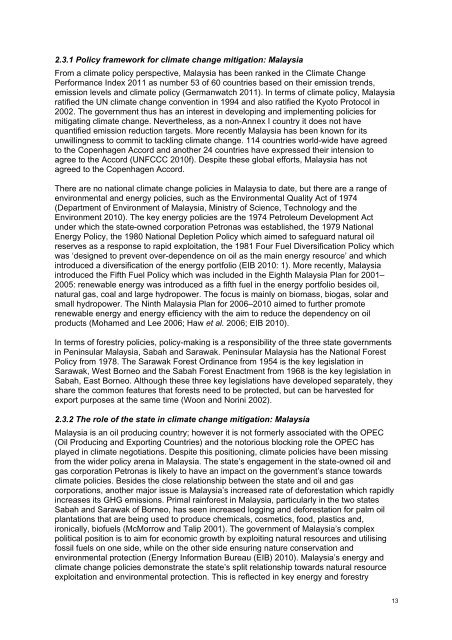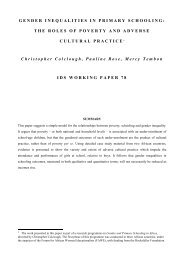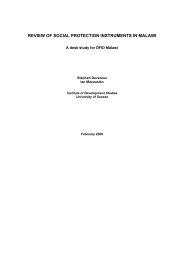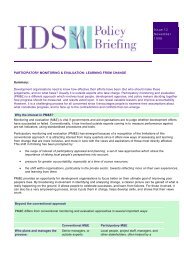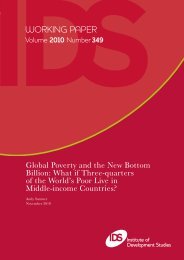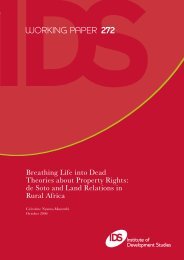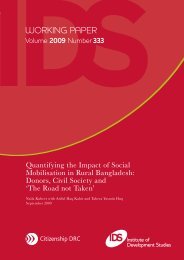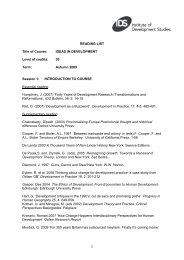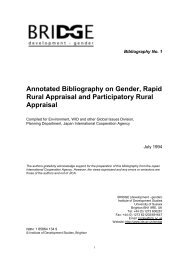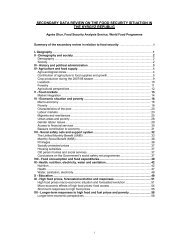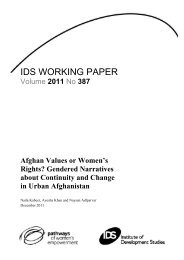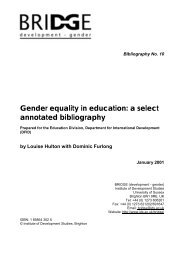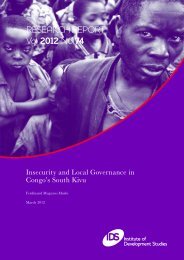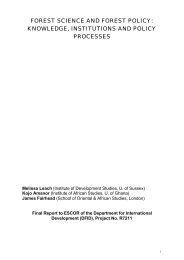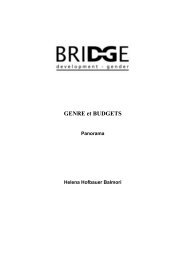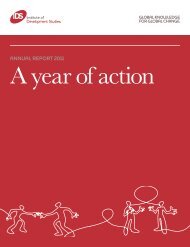IDS WORKING PAPER - Institute of Development Studies
IDS WORKING PAPER - Institute of Development Studies
IDS WORKING PAPER - Institute of Development Studies
You also want an ePaper? Increase the reach of your titles
YUMPU automatically turns print PDFs into web optimized ePapers that Google loves.
2.3.1 Policy framework for climate change mitigation: Malaysia<br />
From a climate policy perspective, Malaysia has been ranked in the Climate Change<br />
Performance Index 2011 as number 53 <strong>of</strong> 60 countries based on their emission trends,<br />
emission levels and climate policy (Germanwatch 2011). In terms <strong>of</strong> climate policy, Malaysia<br />
ratified the UN climate change convention in 1994 and also ratified the Kyoto Protocol in<br />
2002. The government thus has an interest in developing and implementing policies for<br />
mitigating climate change. Nevertheless, as a non-Annex I country it does not have<br />
quantified emission reduction targets. More recently Malaysia has been known for its<br />
unwillingness to commit to tackling climate change. 114 countries world-wide have agreed<br />
to the Copenhagen Accord and another 24 countries have expressed their intension to<br />
agree to the Accord (UNFCCC 2010f). Despite these global efforts, Malaysia has not<br />
agreed to the Copenhagen Accord.<br />
There are no national climate change policies in Malaysia to date, but there are a range <strong>of</strong><br />
environmental and energy policies, such as the Environmental Quality Act <strong>of</strong> 1974<br />
(Department <strong>of</strong> Environment <strong>of</strong> Malaysia, Ministry <strong>of</strong> Science, Technology and the<br />
Environment 2010). The key energy policies are the 1974 Petroleum <strong>Development</strong> Act<br />
under which the state-owned corporation Petronas was established, the 1979 National<br />
Energy Policy, the 1980 National Depletion Policy which aimed to safeguard natural oil<br />
reserves as a response to rapid exploitation, the 1981 Four Fuel Diversification Policy which<br />
was ‘designed to prevent over-dependence on oil as the main energy resource’ and which<br />
introduced a diversification <strong>of</strong> the energy portfolio (EIB 2010: 1). More recently, Malaysia<br />
introduced the Fifth Fuel Policy which was included in the Eighth Malaysia Plan for 2001–<br />
2005: renewable energy was introduced as a fifth fuel in the energy portfolio besides oil,<br />
natural gas, coal and large hydropower. The focus is mainly on biomass, biogas, solar and<br />
small hydropower. The Ninth Malaysia Plan for 2006–2010 aimed to further promote<br />
renewable energy and energy efficiency with the aim to reduce the dependency on oil<br />
products (Mohamed and Lee 2006; Haw et al. 2006; EIB 2010).<br />
In terms <strong>of</strong> forestry policies, policy-making is a responsibility <strong>of</strong> the three state governments<br />
in Peninsular Malaysia, Sabah and Sarawak. Peninsular Malaysia has the National Forest<br />
Policy from 1978. The Sarawak Forest Ordinance from 1954 is the key legislation in<br />
Sarawak, West Borneo and the Sabah Forest Enactment from 1968 is the key legislation in<br />
Sabah, East Borneo. Although these three key legislations have developed separately, they<br />
share the common features that forests need to be protected, but can be harvested for<br />
export purposes at the same time (Woon and Norini 2002).<br />
2.3.2 The role <strong>of</strong> the state in climate change mitigation: Malaysia<br />
Malaysia is an oil producing country; however it is not formerly associated with the OPEC<br />
(Oil Producing and Exporting Countries) and the notorious blocking role the OPEC has<br />
played in climate negotiations. Despite this positioning, climate policies have been missing<br />
from the wider policy arena in Malaysia. The state’s engagement in the state-owned oil and<br />
gas corporation Petronas is likely to have an impact on the government’s stance towards<br />
climate policies. Besides the close relationship between the state and oil and gas<br />
corporations, another major issue is Malaysia’s increased rate <strong>of</strong> deforestation which rapidly<br />
increases its GHG emissions. Primal rainforest in Malaysia, particularly in the two states<br />
Sabah and Sarawak <strong>of</strong> Borneo, has seen increased logging and deforestation for palm oil<br />
plantations that are being used to produce chemicals, cosmetics, food, plastics and,<br />
ironically, bi<strong>of</strong>uels (McMorrow and Talip 2001). The government <strong>of</strong> Malaysia’s complex<br />
political position is to aim for economic growth by exploiting natural resources and utilising<br />
fossil fuels on one side, while on the other side ensuring nature conservation and<br />
environmental protection (Energy Information Bureau (EIB) 2010). Malaysia’s energy and<br />
climate change policies demonstrate the state’s split relationship towards natural resource<br />
exploitation and environmental protection. This is reflected in key energy and forestry<br />
13


